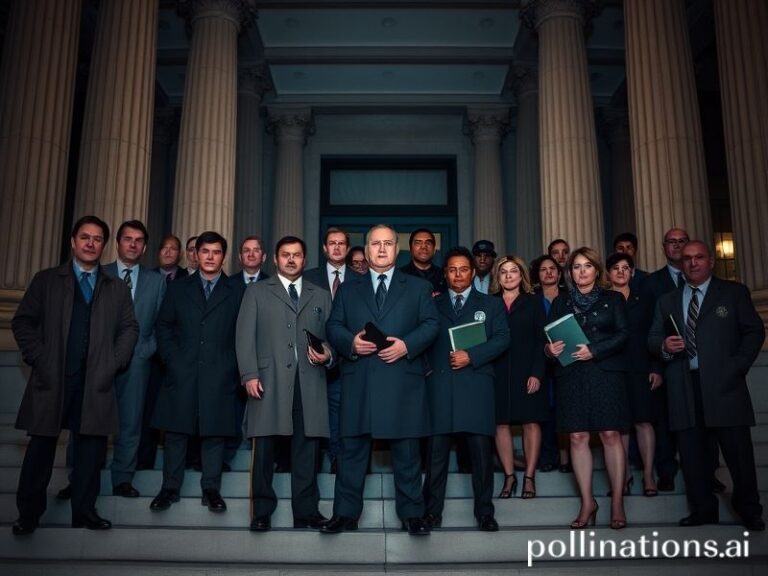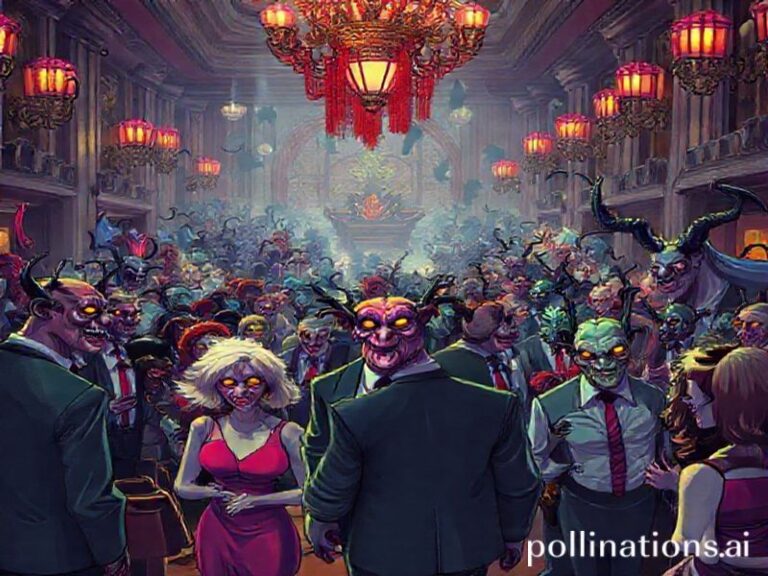How Ashlee Simpson’s Lip-Sync Fiasco Became America’s Soft-Power Suez Moment
Ashlee Simpson and the Geopolitics of a Saturday-Night Snafu
By our correspondent still recovering from 2004
PARIS—Every empire eventually faces its Suez moment: a live, televised humiliation so crisp that satellites beam the collapse of confidence into living rooms from Lagos to Lima. For the American behemoth known as “late-aughts pop culture,” that moment arrived on 23 October 2004, when a nasal jig titled “Pieces of Me” betrayed its own vocalist, and Ashlee Simpson—blond little sister of an already commodified Jessica—executed what historians may one day record as the most efficient regime change of the decade. The crime: lip-synching on Saturday Night Live. The weapon: a rogue backing track. The casualty: the last shred of plausible deniability that the United States exported anything authentic.
Viewed from abroad, the incident was less “oops” than “ah, there it is”—the moment the global assembly line of US pop finally coughed up its own instruction manual. European state broadcasters, then busy lecturing Washington about WMD fantasies, savored the schadenfreude like a 1995 Bordeaux. Le Monde ran a philosophical explainer on “la honte industrielle,” while Der Spiegel calculated the exact RPM at which American soft power spun off its axis. In Seoul, stock analysts quietly downgraded the cultural-import index; if the Yanks couldn’t even fake sincerity convincingly, what hope for the dollar?
But the international significance of Ashlee’s hoedown lies less in the glitch than in the aftermath, a masterclass in post-truth damage control that every authoritarian spin-doctor now keeps thumbtacked above the radiator. Within hours, Simpson blamed her band (classic), blamed acid reflux (innovative), and blamed the merciless hounding of “the media”—a category that somehow excluded the marketing apparatus that had installed her atop the Billboard charts in the first place. The template was set: when caught, deny the premise, monetize the scandal, release a “darker, more personal” album within eighteen months. From Caracas to Cairo, strongmen took notes; if a 19-year-old could rebrand catastrophe as victimhood, imagine what a ministry of information could do.
Economists tracking the burgeoning BRICS economies cite the episode as an early indicator of cultural decoupling. Brazil doubled down on home-grown baile funk; India accelerated Bollywood’s CGI arms race; Russia… well, Russia appointed its own pop tsar and hasn’t looked back since. Meanwhile, China—ever the diligent student—perfected the art of prerecording everything, including, some suspect, the sincerest emotions of its TikTok idols. By 2010, the Global South wasn’t importing American authenticity so much as reverse-engineering its glitches for local flavor. The Simpson Stumble didn’t cause multipolarity, but it provided the soundtrack.
Of course, no geopolitical parable is complete without a pandemic-era epilogue. Seventeen years after her jig, Ashlee re-emerged on TikTok, acoustic guitar in hand, crooning a stripped-down apology that racked up 2.3 million hearts and precisely zero consequences. Commenters from Jakarta to Johannesburg thanked her for “keeping it real this time,” proving that collective amnesia remains humanity’s most renewable resource. The clip now serves as ambient filler in airport lounges from Dubai to Dallas—a gentle reminder that in the attention economy, redemption is just another content vertical, conveniently wedged between ads for VPNs and meal-prep kits.
So what does the saga teach a planet lurching from crisis to curated crisis? First, that every empire outsources its own downfall, one pre-rendered chorus at a time. Second, that the line between soft power and soft-serve grows thinner than the bandwidth separating a lead vocal from its backing track. And finally, that global audiences will forgive almost anything—war, recession, even acid reflux—provided the next single drops on schedule.
Ashlee Simpson never conquered Europe or Asia; she didn’t have to. She simply illustrated, in 3½ minutes of televised panic, that the West’s greatest export was no longer democracy or denim, but the irresistible farce of believing you could sell sincerity and return policy intact. Somewhere in a darkened strategy room, a future dictator is still applauding.







